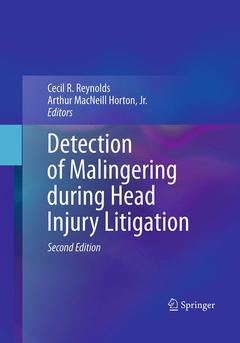Detection of Malingering during Head Injury Litigation (2nd Ed., Softcover reprint of the original 2nd ed. 2012)
Langue : Anglais

Increased public awareness of traumatic brain injuries has fueled a number of significant developments: on the one hand, more funding and more research related to these injuries and their resulting deficits; on the other, the possibility of higher stakes in personal injury suits?and more reasons for individuals to feign injury. Expanding both the conceptual and clinical knowledge base on the subject, the Second Edition of Detection of Malingering during Head Injury Litigation offers the latest detection tools and techniques for veteran and novice alike. As in its initial incarnation, this practical revision demonstrates how to combine clinical expertise, carefully-gathered data, and the use of actuarial models as well as common sense in making sound evaluations and reducing ambiguous results. And, the book navigates the reader through the many caveats that come with the job, beginning with the scenario that an individual may be malingering despite having an actual brain injury. Among the updated features: ?Specific chapters on malingering on the Halstead-Reitan, Luria-Nebraska, and MMPI-2. ?A framework for distinguishing genuine from factitious PTSD in head injury cases. ?Detailed information regarding performance on the WMT, MSVT, and NV-MSVT by children with developmental disabilities. ?Guidelines for explaining symptom validity testing to the trier of fact. ?Entirely new chapters on mild TBI and on malingering of PTSD symptoms in the context of TBI litigation. Professional neuropsychologists and forensic psychologists will appreciate this new edition of Detection of Malingering during Head Injury Litigation as an invaluable source of refinements to their craft, and improvement as an expert witness.
Chapter 1.- Assessment of Malingering and Falsification: Part one, Pushing to the Boundaries of Knowledge and Clinical Practice-Conceptual Issues.- Chapter 2. Assessment of Malingering and Falsification: Part two, Pushing the Boundaries of Knowledge and Clinical Practice-Clinical Application.- Chapter 3. Noncredible Performance in Mild Head Injury.- Chapter 4. Detection of Malingering Using Forced-Choice Techniques.- Chapter 5. Fractitious Responding and Malingered Memory Disorder.- Chapter 6. Performance on the WMT, MSVT & NV-MSVT in Children with Developmental Disabilities and in Adults with Mild Traumatic Brain Injury.- Chapter 7. Detecting Malingering on the Luria-Nebraska Neuropsychological Battery.- Chapter 8. Detection of Malingering and Invalid Test Results Using the Halstead-Reitan Battery.- Chapter 9. Detection of Feigning of Head Injury Symptoms on the MMPI-2.- Chapter 10. Explaining Symptom Validity Testing to the Trier of Fact.- Chapter 11. Distinguishing Genuine from Malingered Posttraumatic Stress Disorder in Head Injury Litigation.- Chapter 12. Clinical Detection of Malingering.- Chapter 13. Clinical Acumen, Common Sense, and Data Based Decision Making: Actuarialism in the Detection of Dissimulation During Head Injury Litigation.- Index.
Cecil R. Reynolds, PhD, ABPN, earned his Doctoral Degree from the University of Georgia in 1978 under the tutelage of Dr. Alan S. Kaufman, with a major in School Psychology and minors in Statistics and in Clinical Neuropsychology. He served an internship divided between the Medical College of Georgia (Pediatric Neurology section and Neurological Surgery section) and the Rutland Center for Severely Emotional Disturbed Children. Prior to joining the Texas A & M University faculty in 1981, Dr. Reynolds was a faculty member at the University of Nebraska-Lincoln, where he served as Associate Director and Acting Director of the Buros Institute of Mental Measurement, after writing the grants and proposals to move the Institute to Nebraska following the death of its founder, Oscar Buros. His primary research interests are in all aspects of psychological assessment with particular emphasis on assessment of memory, emotional and affective states and traits, and issues of cultural bias in testing. He is the author of more than 300 scholarly publications and author or editor of 39 books, as well as several widely used tests of personality and behavior. He maintained a clinical practice treating trauma victims and individuals with traumatic brain injury for 25 years before retiring from clinical work at the end of 2003.Dr. Reynolds holds a Diplomate in Clinical Neuropsychology from the American Board of Professional Neuropsychology, of which he is also a past president, and had a Diplomate in School Psychology of the American Board of Professional Psychology, prior to retiring his Diplomate in 2004. He is a past president of the National Academy of Neuropsychology, APA Division 5 (Evaluation, Measurement, and Statistics); APA Division 40 (Clinical Neuropsychology); and APA Div. 16 (School Psychology). He is a Fellow of APA Divisions 1, 5, 15, 16, 40, and 53. Dr. Reynolds teaches courses primarily in the areas of psychological testing and diagnosis and in neuropsychology in
Updated and revised edition of a systemic, scientific resource for assessing head injury cases in court Contains new chapter devoted to devices that solely target malingering in head injury Reviews pure tests of malingering such as the Validity Indicator Profile and related measures Includes supplementary material: sn.pub/extras
Date de parution : 08-2016
Ouvrage de 381 p.
17.8x25.4 cm
Thèmes de Detection of Malingering during Head Injury Litigation :
Mots-clés :
Brain Injury; Head Injury; Head Injury Litigation; Malingering
© 2024 LAVOISIER S.A.S.



